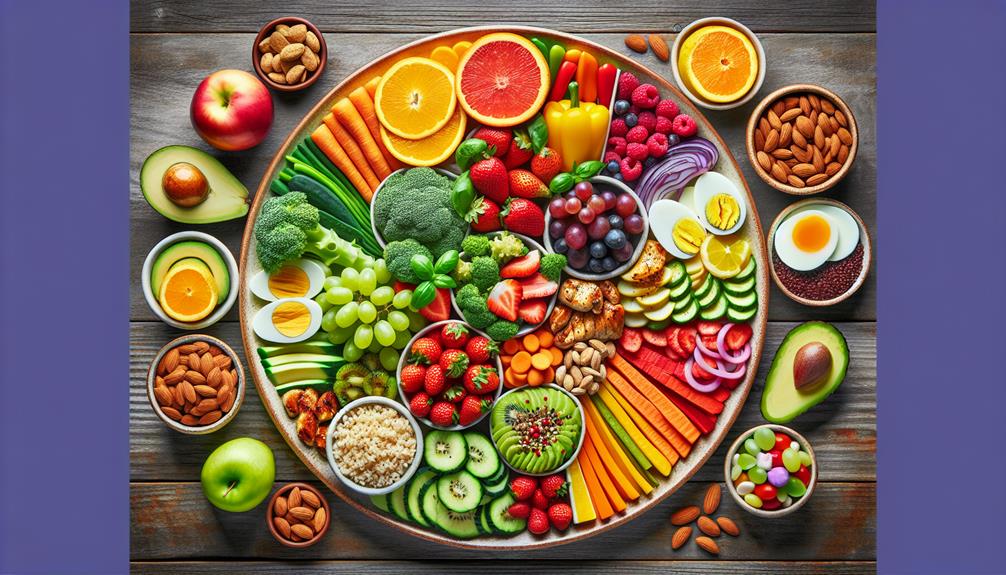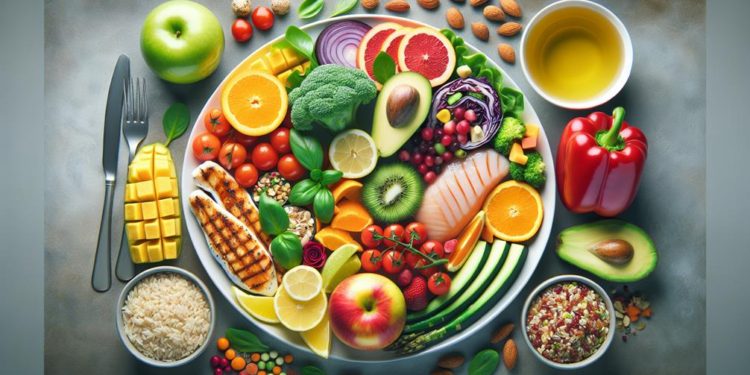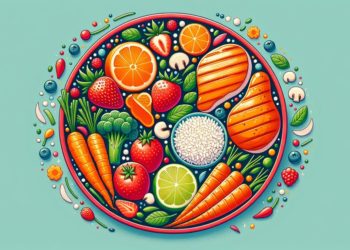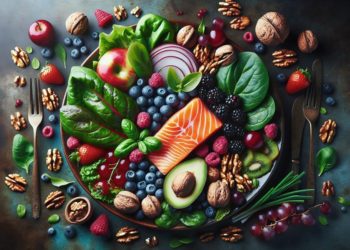Imagine your body as a finely tuned machine, ready to tackle any task or challenge that comes its way. Just like any machine, your body requires the right fuel to function at its best. This is where a balanced diet comes into play. By nourishing your body with the essential nutrients it needs, you can optimize your performance and achieve your goals. But what exactly does a balanced diet entail? How can you ensure that you are fueling your body in the right way? In this discussion, we will explore the essentials of a balanced diet and how it can help you reach your peak performance.
Key Takeaways
- A balanced diet includes macronutrients such as carbohydrates, proteins, and fats, which provide energy and support various bodily functions.
- Hydration is crucial for overall health and optimal performance, as water is involved in nearly every bodily function and helps regulate body temperature and aid digestion.
- Fruits and vegetables should fill half of your plate, as they are low in calories and rich in vitamins, minerals, and fiber.
- Mindful eating habits, such as paying attention to hunger and fullness cues, chewing food slowly, and avoiding distractions, can improve digestion, support weight management, and promote healthier eating habits.
Understanding the Basics
To understand the basics of a balanced diet, you should familiarize yourself with the essential nutrients your body needs to function optimally. One key aspect of nutrition is understanding macronutrients. Macronutrients are the three major nutrients that provide energy to our bodies: carbohydrates, proteins, and fats. Carbohydrates are our main source of energy, found in foods such as grains, fruits, and vegetables. Proteins are essential for building and repairing tissues, and can be found in foods like meat, fish, eggs, and legumes. Fats are important for energy storage and hormone production, and can be found in foods such as oils, nuts, and avocados.
Another crucial aspect of a balanced diet is hydration. Staying properly hydrated is essential for overall health and well-being. Water is involved in nearly every bodily function, from regulating body temperature to aiding digestion and nutrient absorption. Drinking enough water throughout the day helps maintain proper bodily functions and prevents dehydration. It is recommended to drink at least 8 glasses of water per day, but individual needs may vary depending on factors such as activity level and climate.
Understanding macronutrients and the importance of hydration are fundamental to achieving a balanced diet and nourishing your body for optimal performance. By incorporating these principles into your daily routine, you can ensure that you are providing your body with the necessary nutrients and fluids it needs to thrive.
Key Nutrients for Performance
Including key nutrients in your diet is essential for optimal performance. When it comes to pre-workout nutrition, there are a few key nutrients that can help you fuel your body and enhance your performance. Here are four important nutrients to consider:
- Carbohydrates: Consuming a carbohydrate-rich meal or snack before your workout can provide you with the necessary energy to perform at your best. Opt for complex carbohydrates like whole grains, fruits, and vegetables, as they release energy slowly and sustainably.
- Protein: Including protein in your pre-workout meal or snack can help support muscle growth and repair. Aim for a combination of high-quality protein sources, such as lean meats, poultry, fish, beans, or tofu.
- Hydration: Staying hydrated is crucial for optimal performance. Make sure to drink enough water before your workout to prevent dehydration and maintain your energy levels.
- Electrolytes: Electrolytes like sodium, potassium, and magnesium play a vital role in muscle function and hydration. Consuming electrolyte-rich foods or beverages can help replenish these essential minerals lost through sweat.
When it comes to post-workout recovery, refueling your body with the right nutrients is equally important. Prioritize replenishing carbohydrates to restore glycogen stores, protein to support muscle repair, and hydration to replace fluids lost during exercise. Consider incorporating nutrient-dense foods like fruits, vegetables, lean proteins, and whole grains into your post-workout meal or snack. Remember to listen to your body and adjust your nutrient intake based on your specific needs and goals.
Building a Balanced Plate

Ensure that your plate is balanced with a variety of nutrient-rich foods to support your overall health and well-being. Building a balanced plate involves portion control and incorporating foods from different food groups. This ensures that you are getting a wide range of essential nutrients.
To start, fill half of your plate with fruits and vegetables. These are low in calories and high in vitamins, minerals, and fiber. Aim for a variety of colors to get a diverse array of nutrients.
Next, include lean protein sources, such as poultry, fish, beans, or tofu. These provide important amino acids for muscle repair and growth.
Whole grains, such as brown rice, quinoa, or whole wheat bread, should make up a quarter of your plate. They are a great source of complex carbohydrates and fiber, providing sustained energy throughout the day.
Don't forget about healthy fats! Add a small serving of nuts, seeds, avocados, or olive oil to your plate. These fats help with nutrient absorption and support brain health.
Lastly, be mindful of portion sizes. Use smaller plates and bowls to help control the amount of food you eat. Listen to your body's hunger and fullness cues to avoid overeating.
Healthy Snacking for Sustained Energy
For sustained energy throughout the day, incorporating healthy snacks into your diet is essential. Snacking can help stabilize blood sugar levels, prevent overeating at mealtimes, and provide the body with a steady supply of nutrients. To make the most of your snacks, here are four tips to keep in mind:
- Choose nutritious options: Opt for snacks that are rich in protein, fiber, and healthy fats. These nutrients can help keep you full and provide sustained energy. Examples include Greek yogurt with berries, a handful of nuts and seeds, or carrot sticks with hummus.
- Practice portion control: While snacking is important, it's crucial to watch your portion sizes. Overeating on snacks can lead to weight gain and energy crashes. Aim for a snack that is around 150-200 calories and satisfies your hunger without leaving you overly full.
- Plan ahead: Prepare your snacks in advance to avoid grabbing unhealthy options on-the-go. Pack a small container of mixed fruit, pre-cut vegetables, or homemade trail mix to have on hand when hunger strikes.
- Listen to your body: Pay attention to your hunger and fullness cues. Snack when you're genuinely hungry, not out of boredom or habit. Remember to eat mindfully, savoring each bite and taking time to appreciate the nourishment your snack provides.
Incorporating Mindful Eating Habits

Incorporate mindful eating habits into your daily routine to enhance your overall well-being and make the most out of your meals. Mindful eating involves paying full attention to the experience of eating, from the taste and texture of the food to the feelings of hunger and fullness. By adopting these practices, you can reap numerous benefits for your physical and mental health.
One of the key benefits of mindful eating is improved digestion. When you eat mindfully, you allow your body to fully process and absorb the nutrients from the food. This can lead to better nutrient absorption and reduced digestive discomfort.
Mindful eating also helps with weight management. By paying attention to your body's hunger and fullness cues, you are less likely to overeat or indulge in emotional eating. This can support healthy weight loss or maintenance goals.
To incorporate mindful eating techniques into your routine, start by eating without distractions. Turn off the TV and put away your phone, allowing yourself to fully focus on the meal. Chew your food slowly and savor each bite, paying attention to the flavors and textures. Listen to your body's hunger and fullness signals, eating until you are satisfied but not overly full.
Incorporating mindful eating habits can have a profound impact on your overall well-being. By being present and attentive during meals, you can improve digestion, support weight management, and cultivate a healthier relationship with food. Start practicing mindful eating today and discover the transformative power it can have on your health.
Frequently Asked Questions
What Are Some Common Misconceptions About Balanced Diets?
Misunderstood concepts and dietary myths abound when it comes to balanced diets. It's important to separate fact from fiction and prioritize nutritious, whole foods. Don't fall for quick fixes or fad diets.
How Can a Balanced Diet Help Improve Athletic Performance?
A balanced diet is essential for improving your athletic performance. Proper nutrition plays a crucial role in sports performance, providing the fuel and nutrients your body needs to perform at its best.
Are There Any Specific Nutrients That Are Important for Recovery After Exercise?
After exercise, specific nutrients are important for recovery. These include protein for muscle repair, carbohydrates for replenishing energy stores, and electrolytes for hydration. Make sure to include these in your post-workout meals for optimal recovery.
What Are Some Tips for Portion Control and Avoiding Overeating?
To control portions and avoid overeating, try using smaller plates, measuring serving sizes, and listening to your body's hunger cues. Practice mindful eating by savoring each bite and paying attention to how full you feel.
Can Mindful Eating Practices Help With Weight Management?
Mindful eating techniques, such as paying attention to hunger and fullness cues, can be helpful for weight management. By being present and aware of your food choices, you can make healthier decisions and avoid overeating.
Conclusion
So remember, a balanced diet is essential for nourishing your body and optimizing performance. Just like a well-oiled machine, your body needs the right fuel to function at its best. By incorporating key nutrients, building a balanced plate, and practicing mindful eating, you can fuel yourself for success. Think of your body as a finely tuned sports car, and your diet as the premium fuel that keeps it running smoothly. Invest in your health by making nutritious choices and enjoy the benefits of improved performance and overall well-being.













